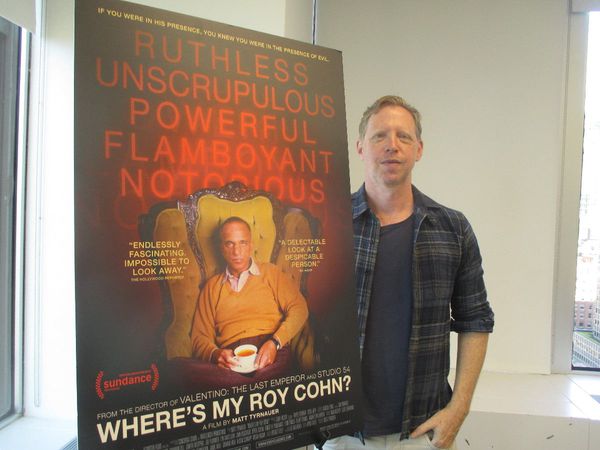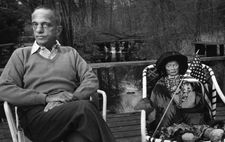In the second half of my conversation with Matt Tyrnauer (Valentino: The Last Emperor; Citizen Jane: Battle For The City; Scotty And The Secret History Of Hollywood; Studio 54 on Ian Schrager) on his latest documentary Where's My Roy Cohn? we discussed what George McGovern told him about the 'Big Lie', how Robert Taylor, Gary Cooper, Ronald Reagan and others were used during 'The Blacklist', and Joseph Welsh's historic response during the Army-McCarthy hearings (also seen in George Clooney's Good Night, And Good Luck) and Welsh's role in Otto Preminger's Anatomy Of A Murder, starring James Stewart, Lee Remick and Ben Gazzara.
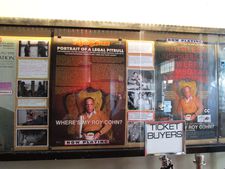 |
| Matt Tyrnauer: "In the post-war period in this country, Roy Cohn and Joseph McCarthy practised "Big Lie" propaganda techniques." Photo: Anne-Katrin Titze |
Anne-Katrin Titze: The idea of the 'Big Lie', taken from Mein Kampf, as a strategy gives me chills. The tactics reach far.
Matt Tyrnauer: The 'Big Lie', which was Hitler's and Goebbels', is a very powerful tool of demagogic politics. In the post-war period in this country, Roy Cohn and Joseph McCarthy practised 'Big Lie' propaganda techniques. Roy Cohn, who, as an instigator on the political right, after the Second World War was taking, frankly, Nazi tactics, and using them to create a culture, an environment of fear to gain political power.
George McGovern, who was the presidential nominee for the Democrats in 1972, told me when I was working with him on an essay that it's very hard for people in the centre or in the centre left to accuse people on the right of the 'Big Lie', or anything that is attached to Hitler. Because it always seems as if you're going beyond the pale. Because what Hitler did was unparalleled in modern history.
So there's a certain strange inoculation that the right has against those accusations, whereas the left is very vulnerable. Because you can say "socialist", "communist". And it's effective because of the way that our history is taught.
AKT: The tactics become so very clear in your film. What does it mean? Well: Never admit anything; attack others for what you do yourself; call failures success; the bigger the lie, the more it will be believed. The way it is done, spelled out, I think, is still shocking to people.
You also give context to the wonderful moment, captured on film, of Joseph Walsh telling McCarthy: "Have you no sense of decency, Sir?" Most people will know it from somewhere, but don't know that it's the Army-McCarthy hearings where it's from.
MT: Again, "United States of Amnesia". And also our terrible education system in this country. When you start to drill down into important moments in American history and really understand them and try to organise them in a way as this film does, where an audience can comprehend them and really connect with them, you realise how little we're taught.
I had a private school education which was very liberal and I knew all this stuff, but it wasn't taught to me in any organised way that made me actually fully comprehend it. Also, I don't think anyone ever thought we would need to know these lessons. I think we thought that this was something that was behind us. Maybe we needed to be vigilant, but we never would really need to understand fully. I think there was a kind of zeitgeist, a kind of groupthink consensus, you know, this is past us. Of course we realise now that it's not.
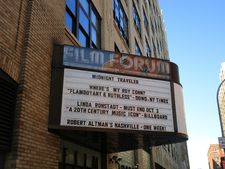 |
| Where's My Roy Cohn? on the Film Forum marquee Photo: Anne-Katrin Titze |
So, the McCarthy era is a lot of things but it all tends to get lumped together and labelled 'The McCarthy Era' or 'The Blacklist' or 'Naming Names'. But there were distinct movements in that period that people don't parse. So there's HUAC, House Un-American Activities Committee, there's the Hollywood Ten, which was when the right-wing Washington was going after Hollywood.
AKT: That's where you always see clips of Robert Taylor, Gary Cooper, Ronald Reagan pointing the finger.
MT: Right. And that was done very purposely because what better way to get attention than to accuse famous people of wrongdoing? I mean, it was a demagogic tactic. There was no need to cleanse Hollywood of communism. There was no threat of communism in Hollywood. Period. None. The people that were accused of being communists, if they even were, had been affiliated decades before the war. It was all nonsense.
McCarthy was his own special category, and his Senate Subcommittee [on Investigations], investigating communists generally in the Federal Government. The Army-McCarthy hearings were a passage in his demagogic reign, pretty much the final passage because Joseph Welsh discredits him in this incredible bravura moment, which was televised.
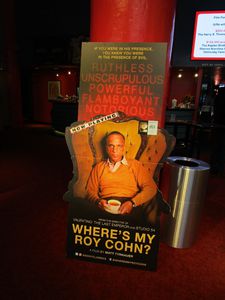 |
| Matt Tyrnauer: "I think there was a kind of zeitgeist, a kind of groupthink consensus, you know, this is past us. Of course we realise now that it's not." Photo: Anne-Katrin Titze |
AKT: It's remarkable.
MT: And he says "At long last, have you left no sense of decency, Sir?"
AKT: He appeals to his decency twice.
MT: And that caught the national consciousness and it really was the beginning of the end for McCarthy and for Cohn in that moment.
AKT: And Otto Preminger cast Joseph Welsh in Anatomy Of A Murder, as a judge, after that. Preminger of all people!
MT: Brilliant, yeah.
AKT: It's the downfall for McCarthy, but...
MT: … Cohn comes back. Because he moves back to New York and puts himself in the swim of a very transactional society where money and power are the coin of the realm and ethics and morality and right-mindedness are really secondary or tertiary.
Read what Matt Tyrnauer had to say on Gore Vidal and the "United States of Amnesia", being a "big fan" of William Friedkin, Anne Roiphe's connection to Roy Cohn's mother, and "the darkest parts of the American psyche" in Where's My Roy Cohn?
Where's My Roy Cohn? is in cinemas in the US.








